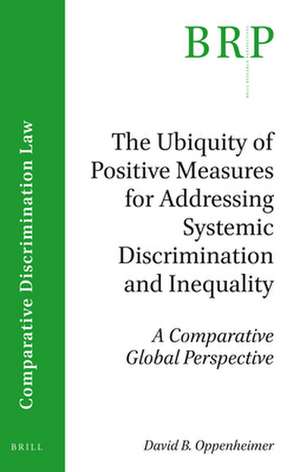The Ubiquity of Positive Measures for Addressing Systemic Discrimination and Inequality: A Comparative Global Perspective: Brill Research Perspectives in International Law / Brill Research Perspectives in Comparative Discrimination Law
Autor David Oppenheimeren Limba Engleză Paperback – 21 aug 2019
Preț: 835.62 lei
Preț vechi: 1019.05 lei
-18% Nou
Puncte Express: 1253
Preț estimativ în valută:
159.90€ • 167.37$ • 133.08£
159.90€ • 167.37$ • 133.08£
Carte indisponibilă temporar
Doresc să fiu notificat când acest titlu va fi disponibil:
Se trimite...
Preluare comenzi: 021 569.72.76
Specificații
ISBN-13: 9789004345980
ISBN-10: 9004345981
Dimensiuni: 155 x 235 mm
Greutate: 0.05 kg
Editura: Brill
Colecția Brill
Seria Brill Research Perspectives in International Law / Brill Research Perspectives in Comparative Discrimination Law
ISBN-10: 9004345981
Dimensiuni: 155 x 235 mm
Greutate: 0.05 kg
Editura: Brill
Colecția Brill
Seria Brill Research Perspectives in International Law / Brill Research Perspectives in Comparative Discrimination Law
Notă biografică
David B. Oppenheimer (J.D. Harvard 1978) is a Clinical Professor at Berkeley Law, and the author of many books, book chapters and articles on anti-discrimination law, including the leading U.S. textbook on Comparative Equality. He is the convenor of a global study group on comparative equality and anti-discrimination law.
Cuprins
The Ubiquity of Positive Measures for Addressing Systemic Discrimination and Inequality: A Comparative Global Perspective
David B. Oppenheimer
Abstract
Keywords
Introduction
Part 1: Positive Measures and Labor/Employment Law
Part 2: Positive Measures in Higher Education
Part 3: Parity Democracy – State Legislative Bodies
Part 4: Positive Measures and Corporate Boards
Part 5: Conclusion – The Global Ubiquity of Positive Measures
Acknowledgements
Bibliography










